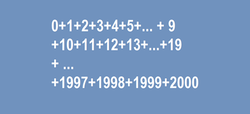This section requires Javascript.
You are seeing this because something didn't load right. We suggest you, (a) try
refreshing the page, (b) enabling javascript if it is disabled on your browser and,
finally, (c)
loading the
non-javascript version of this page
. We're sorry about the hassle.
1 solution
Moderator note:
Can you prove that n = 0 ∑ k n = 2 k ( k + 1 ) ?
Replying to the challenge master note. This proof can be completed through mathematical induction.
Prove: 1 + 2 + 3 + 4 + . . . + n = 2 n ( n + 1 )
Show for n=1
2 1 ( 1 + 1 ) = 2 2 = 1
Inductive hypothesis. Assume true for n=k
1 + 2 + 3 + 4 + . . . + k = 2 k ( k + 1 )
Prove for n=k+1
1 + 2 + 3 + 4 + . . . + k + ( k + 1 ) = 2 ( k + 1 ) ( k + 2 )
2 k ( k + 1 ) + ( k + 1 ) = 2 ( k + 1 ) ( k + 2 )
2 k 2 + k + 2 2 k + 2 = 2 ( k + 1 ) ( k + 2 )
2 k 2 + 3 k + 2 = 2 k 2 + 3 k + 2
Q.E.D
Use \displaystyle before the sum to make it look like this: n = 0 ∑ k n = 2 k ( k + 1 )

n = 0 ∑ k n = 2 k ( k + 1 )
n = 0 ∑ 2 0 0 0 n = 2 2 0 0 0 ( 2 0 0 1 )
n = 0 ∑ 2 0 0 0 n = 1 0 0 0 ( 2 0 0 1 ) = 2 0 0 1 0 0 0